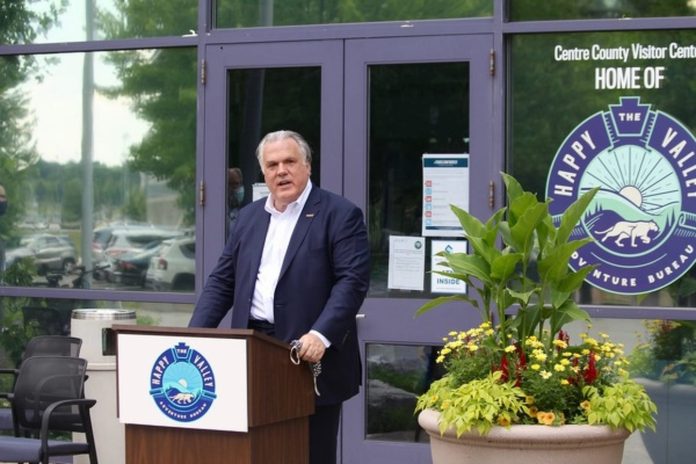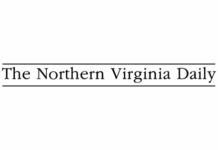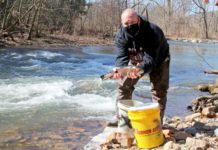Fritz Smith, president and CEO of the Happy Valley Adventure Bureau, speaks on June 25, 2020 outside of the Visitors Center on Park Avenue in State College. State College.com file photo | Geoff Rushton
Frederick “Fritz” Smith, president and CEO of the Happy Valley Adventure Bureau for the past two years, is optimistic that after the pandemic, Centre County will be stronger than ever, and once again will become a destination of choice for leisure travelers, as well as a popular place to hold meetings and sporting events.
A nonprofit representing more than 370 members, the HVAB completed a rebranding and major marketing campaign just more than a year ago. HVAB’s mission is to develop, promote, and engage in travel-related activities and coordinate visitor services designed to enhance the economic activity and quality of life within Centre County.
Prior to coming to Centre County, Smith was vice president at Visit Philadelphia for four years, serving as a liaison to the hotel community and managing the research and measurement efforts. Born in Roaring Spring, Smith’s mother grew up in Bedford and his father was in the Navy. Shortly after he was born, the family moved to Morocco for four years before moving to the Washington, D.C., area.
Smith earned a degree in political science from Elizabethtown College. After college, he started working in the hotel industry and fell in love with the hospitality business. Town&Gown founder Mimi Barash Coppersmith interviewed Smith via Zoom to discuss what lessons we can take away from the pandemic that will shape tourism in Centre County in the future.
Mimi: Reading your bio, you are certainly meant to be in this business. What would you say is the biggest part of the problem we are now facing in Happy Valley, as a result of the pandemic?
Fritz: Looking at this from the organization’s perspective and the 377 members that I represent, they are almost exclusively composed of businesses that rely on visitors and the spending that is entailed with their visitation. So, the biggest challenge, from our perspective, is that the traveling public doesn’t feel comfortable traveling right now.
Mimi: They’re not supposed to and highly discouraged. We’re supposed to comply with pretty tough rules.
Fritz: Yeah, we are. Pennsylvania has some pretty strict rules that discourage people from traveling, and our local businesses have operating conditions that make it challenging for them to maximize any revenue-generation opportunities that they may have. Right now, we’re almost nine months into the pandemic. And travel confidence is at an all-time low. There’s a survey that the travel industry subscribes to, and 58 percent of the population doesn’t feel comfortable traveling anywhere. Our businesses need paying customers right now, and that’s not going to happen. So, that’s the challenge in a nutshell.
Mimi: Many organizations with great needs are doing similar things or complementary things in separate efforts, trying to do the wonderful things we do around here. How do we use this to get ourselves on a path to think about a greater amount of collaboration between and among all divisions that make up Happy Valley?
Fritz: When so many organizations, businesses, nonprofits, and governmental units are struggling and just trying to stay alive, I think it’s hard to have that conversation right now. I think lots of people understand intuitively that we need to have it. When the dust settles a little bit, there’s going to have to be some hard conversations about the over-reliance that we have on one large institution here. We’re going to have to broaden the appeal of Centre County. It’s a great place to locate a business. It’s a great place to retire to; many people do that already. But we’ve got to make sure that it’s an appealing place for people who are in a younger age bracket as well. That means, what can they do to work here?
I think we do need a large community conversation when things start to get better – not when they’ve completely recovered because then complacency sets in. So, somewhere between the trough and the full recovery, we need to have a large community conversation. And I think that you point out that part of what we tried to do with the Happy Valley umbrella when we rebranded this organization was, we wanted it to encompass a broader area because people think of Happy Valley as a fairly limited geography. But we want it to encompass Moshannon Valley, Penns Valley, Bald Eagle Valley, and so forth.
Mimi: The problems that the hotel industry is facing now are very painful. But there are questions that are always raised about how those rates go up at the important times of the year, so sometimes you can think of that as offsetting. How do we figure out avoiding the extremes?
Fritz: Many people do feel that there’s a little bit of a comeuppance that maybe was due. But I think that some of those perceptions maybe are a little bit outdated, because if you look at how the hotels have operated over the last few years, they were starting to get somewhat negatively impacted by the introduction of Airbnb and other sharing economy players were starting to erode into their ability to charge those high prices that they were famous for. So that was starting to come down a little bit. But the crash has been severe. I think in that hotel community, there may be some that don’t make it into next year.
Mimi: Well, so long as the pandemic continues, is there a solution?
Fritz: We clearly need to get more stimulus. I don’t know whether it’s going to happen during the waning days of the current president’s administration or whether it’s going to wait until the new president takes office. I really think that the sense of urgency needs to be now. I think it would be really unfortunate if we don’t get some more assistance out there for our struggling businesses. [Note: After this interview was conducted, Congress passed a new stimulus bill that included $285 billion for the Paycheck Protection Program.] Twenty percent of the unemployed people in Centre County are in the leisure and hospitality business. We need to get some additional reasons to smooth out those peaks and valleys that you talked about with the hotel industry. We need to really emphasize that this is a 365-day-a-year destination. And there are reasons for people to come here every day of the year.
Mimi: The university has an impact in a geographic area much greater than Centre County alone. I believe we have to have more conversations with our contiguous neighbors because everybody in central Pennsylvania is suffering, including the university.
Fritz: When they sneeze, everybody else gets a cold, and they’ve had a tough year. I interact with many different arms of the university. And I must say that I think they’ve handled the whole pandemic quite well.
Mimi: You came here with solid experience and knew what you were talking about. You’ve done some research, which is terribly important. What have you learned about the people who visit the greater State College area? What are the key characteristics of this audience?
Fritz: It’s a well-educated audience. The majority of visitors come from a handful of urban places: Philadelphia, New York, Washington, D.C., and Pittsburgh. You add all those together, and that’s well over half of the visitors. Those are people who have a lot of discretionary income. They like to do the things that we can offer them. But what those markets all have in common is they’re expensive to market in.
We’ve also found in the research that they’re not spending the amount of money that is fairly typical for a destination visit. So that says to me that they have an image in their mind of an inexpensive place where there isn’t a whole lot to do. They don’t budget for those trips to the degree that we would like them to. We’d like to see the spending go up. That means that we need to tell a more expansive story about Happy Valley, about all the little nooks and crannies and additional things for them to do.
They spend a little bit too much time in State College; that’s absorbing the lion’s share of their visits here. So, it says to me that we’re not maximizing our potential that could be realized by getting them out to see Bellefonte, Millheim, Philipsburg, Snow Shoe, and so forth. I think that’s the biggest takeaway is that we need to get them to come back more and explore more when they get here.
Mimi: Have you considered packages?
Fritz: Absolutely. We just had a discussion with some of our hoteliers about packages. Part of the conversation revolved around the fact that we want to try to find another word because the word package doesn’t test well. It doesn’t resonate with people too well anymore. Package sort of sounds like a 1970s term. The funny thing about travelers is they want to get a deal, but they also don’t want to think that they’re with a bunch of other people who are getting a deal. They want something exclusive that speaks to them. And I think the word package is just too generic. So, we’re going to do packaging, but we’re going to call it something else. Stay tuned for the marketing.
Mimi: Is it on the horizon?
Fritz: Absolutely. There are a lot of things that are on the drawing board for the spring. But the challenge is that this pandemic just keeps going a little bit longer than we thought it would. There was a point where we thought it would be over in the fall. So, we were planning some pretty big things in the fall. And there was a time when we thought it’d be over by now. And we were planning for now. Now we’re starting to plan things for the spring, but starting to ask the question, are we going to be able to execute those plans?
Mimi: Looking at the longer picture, it seems to me that one of the unique, wonderful, even somewhat exclusive assets of the valley is fly fishing. To what extent has that been dealt with as a real attraction for visitors?
Fritz: I don’t know if you’re familiar with a film that was created this year called Live the Stream, sort of a documentary all about Joe Humphreys. It has great footage of the streams and fly fishing that that you can do in Centre County. Senator (Jake) Corman’s office helped financially support that, and we did a lot of work with it as well and helped to market it. We got some great footage out of that film.
I tell everyone that I encounter that that I’m hungry for content on our website and video content about the great assets here. Fly fishing is absolutely one of the reasons for people to come here that we can capitalize on.
Mimi: Which of our attributes are most appealing to visitors from your research?
Fritz: It’s outdoor beauty. It gets mentioned over and over again. They appreciate the mountains, the mountain views. There’s a lot of sentimentality about Mount Nittany, in particular. One of the other attributes that people talk about, our research found, was that people felt safe when they came here. So, that sense of security and safeness and friendliness.
Mimi: What are the lessons you learned from COVID, if any?
Fritz: This isn’t the first time that I’ve been through a real economic downturn, although this one has been more severe for us than others that I’ve experienced. But I think what always happens is, your creativity gets challenged, and you have to find ways to do things in a more cost-effective manner. It forces you to think about partnerships: What can we do? Who can I call upon to help us achieve this?
One of the other things is that so many people in this community are proud of it, like you, are very proud of where they live and love to tell people about it. I want to make better use of some of those people. I’d like to bring some of them in as volunteers to man our visitor information desk, both here and Bellefonte. I want to open a satellite office in Philipsburg and bring in some volunteers who know that area really well, are proud of it, and give people good suggestions.
One of the lessons that organizations like this have learned over the years is that we were too externally focused for many years. And many of them learned the hard way that your local residents and stakeholders are just as important as the external customer you’re trying to bring in; you’ve got to have them bought into the process. You’ve got to make them feel like they’re part of it.
Mimi: To what extent do you and the chamber interact?
Fritz: We interact quite a bit. The chamber was one of the main partners on the Helping Happy Valley initiative. We partnered on a really good agritourism initiative called Happy Valley Agventures that now has its own standalone website that the staffs of both organizations contributed to. I don’t know if you’ve seen some of the signage that’s out at some of the sites like Tait Farm and Harner Farm, but there’s some uniform signage that’s outside about 40 businesses right now that we think of as agritourism businesses.
Vern Squier (president and CEO of the Chamber of Business and Industry of Centre County) and I co-chair a direct flight committee. When we come out of this pandemic, we really want to get the business community involved in that effort to try to attract more direct flights here, because that’ll benefit everyone. It’ll benefit residents, students, the school, it will help us to grow our business base.
Mimi: To what extent do you work and collaborate with Penn State?
Fritz: There are so many ways. Charima Young from the government affairs team is on our board, as is Tom Neely, the Nittany Lion Inn general manager. We pay rent here at the visitor center to Penn State. One of the departments that we really work most closely with is intercollegiate athletics. Because there are many sporting events this community can compete for, whether it’s a collegiate event or a high school event or amateur volleyball, basketball, softball, whatever that is, we often partner with them to put together a joint bid to try to secure that event.
Mimi: Speaking of partnership, did you have anything to do with the saving of the Spikes?
Fritz: There’s yet another great example. When Scott Walker, the Spikes’ general manager, started to put that (Save Our Spikes) campaign together, the first two institutions and organizations he called upon were us and the CBICC. And we right away agreed to be the first investors in the Save Our Spikes campaign.
Mimi: I think that’s a happy sign that we’re still going to have a minor league team.
Fritz: It’s a really interesting concept. The team is going to be populated by guys who are probably going to get drafted by Major League Baseball, and they’ll be competing against other players who just got out of college and are ready for Major League Baseball. It’s going to be a great way to showcase those players.
Mimi: Do you have the statistics in terms of how much the visitor industry has lost in the last year in Happy Valley?
Fritz: We pay a lot of attention to that. Unfortunately, it’s a sad story to keep track of, but it’s important that we do. To (December 1) from mid-March, we’ve lost about $132 million in visitor spending if you compare it to last year.
Mimi: What are the layoffs in that industry?
Fritz: During normal times in this county, about 5,200 people are employed in the leisure and hospitality sector. That’s restaurants and hotels, museums, think of Penn’s Cave, think of performing arts places like the Bryce Jordan Center and The State Theater. About two-thirds of those people were laid off in April and May. A good number of them got called back during the summer, but we’re only at about two-thirds of that employment level right now. So about 1,600 people are still unemployed from that sector.
Mimi: Speaking of the summer, because of the pandemic, the (Arts) Festival has been hurt financially.
Fritz: I’m very concerned about some of our nonprofits. It’s not just the businesses that we’re concerned about. They are part of the group that needs some stimulus help. These are our businesses and nonprofits that are struggling through no fault of their own. They didn’t do anything wrong. And I think that’s when it’s appropriate for the government to come in and help.
Mimi: If you wanted to leave our readers with a special message, what would that be?
Fritz: It’s to support your local businesses. Let’s help keep those businesses alive and get them to the other side.
Mimi: Well, you’re in a powerful job in a very interesting place. And I love to know that we have a guy that seems to know what he’s doing to help us solve a very serious problem. Thank you for sharing your input with us.
Fritz: Thank you, Mimi.
Credit: Source link






























